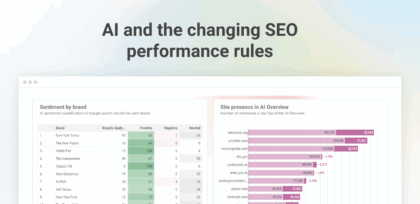How to best utilise ChatGPT for SEO
26 Jul 2023|7 MIN READ
Since the start of 2023, AI and ChatGPT have been the buzzwords on everyone’s lips. The rise of AI caused some degree of panic in the SEO community, but as we’ve seen things like BARD and ChatGPT develop, it’s pretty obvious that working in SEO has never been more exciting. Something I spoke about recently here.
But how can digital marketers utilise these new and exciting developments? And more specifically, how can SEOs get the most out of new technologies like ChatGPT?
In this blog post, I want to show you how AI, specifically ChatGPT SEO, can save you hours of work. And how, if appropriately utilised, ChatGPT can do all of the heavy and laborious SEO tasks for you.
Can ChatGPT be used for SEO?
In a recent webinar: ChatGPT for SEO, I delved into numerous SEO tasks and use cases that ChatGPT can help with – sharing the best ChatGPT SEO prompts and plugins to get the most out of ChatGPT and save you hours of work.
ChatGPT can be used for numerous SEO tasks, such as:
- Keyword research
- Intent classification
- Clustering
- Building a content plan
- Building topical maps
- Analysing a page
- E-E-A-T analysis
- Devising a scoring system
- Core Web Vital analysis
- Using Wolfram for charts
- Transcribing videos
- Algorithmic checklists
Mastering the use of prompts is key when it comes to using ChatGPT for SEO. And lucky for you, I’ve spent hours researching and experimenting to build out and refine a playbook of essential prompts which I share later on in this post.
What are the ChatGPT plugins for SEO?
Plugins are a powerful way to get ChatGPT to do more for you. I’ve reviewed all of the SEO-related plugins and highlighted some of my favourites, which you can see below.
WebPilot – Analyses web pages in real-time
Wolfram – A great plugin for building charts
Website Performance – Analyse core web vitals
VoxScript – Digest video content quickly
KeyMate – A great plugin for conducting keyword research
Scraper – Used to scrape the links off a page and analyse the number of internal and external links
If you’d like more detail on the best SEO plugins for ChatGPT, how to get them set up, or which ones to use and when, watch my webinar below.
What are the best ChatGPT SEO prompts?
I’ve done the research and come up with a tried and tested formula for creating the best, and most successful, prompts for ChatGPT that will work seamlessly to help you keep on top of daily SEO tasks.
So when it comes to asking ChatGPT to do something for you, what’s my formula for success?
- Be specific – if you’re not specific you’ll get fluffy answers back
- State your intention – tell ChatGPT exactly what you need this information for
- Direct the output format – if you need a table, you tell ChatGPT that you want a markdown with the exact number of columns, you say what you want the headers of those columns to be and the information you want to see in those individual cells
- Ask follow-up questions – never be satisfied with the first answer from ChatGPT – if you don’t think it’s the perfect answer ask follow-up questions
- Experiment with different phrasing
- Fact-check the output – you can even input ChatGPT’s original answer and ask it to fact check
Simply put, you need to think: Context + specific information + intent + response format
The best ChatGPT SEO prompts for keyword and question research
A super simple one to get started with – using ChatGPT for your keyword research.
ChatGPT SEO prompt: “I want you to act as an SEO expert and provide me with 10 keyword alternatives for the search phrase: best men’s blazers. Don’t mention brand names”
An important thing to remember is that you can input any number of keywords that you require and specify your audience by asking ChatGPT to return keywords for a UK searcher, for example.
To expand this prompt a little further, why not ask ChatGPT to also provide you with the search intent for each keyword too? Simply use the prompt below:
ChatGPT SEO prompt: “Act as a keyword research expert. I want you to generate a list of 20 keywords closely related to “men’s blazers” without duplicating any words.
Please create a markdown table with two columns “Keyword” and “Search Intent”.
The first column should be the keyword you generated, and the second column should be the search intent of the keyword (commercial, transactional, navigational, informational, local or investigational).
Do not repeat yourself. Do not self-reference. Do not explain what you are doing.”
Next, use a similar prompt to help with question research for your next piece of content…
ChatGPT SEO prompt: “Act as a men’s fashion writer. You are writing a long-form article about the best men’s blazers for this summer. List five questions I should try to answer in my content.
Please create a markdown table with two columns “Question” and “Website”.
The first column should be the question you generated.
The second column should be the top-ranked website for that question, the URL and the page title.”
To see a live demonstration of how to use these prompts and the output each generates, watch my webinar below.
The best ChatGPT SEO prompts for long-tail content ideas
Next up, try this prompt that will help you generate some fresh, SEO-boosting long-tail content ideas. Take a look…
ChatGPT SEO prompt 1: “I run a website about skateboarding and longboarding. What are some sub-niches I should be tackling with my content. Give me the results as a table with the sub-niche a number between 1 and 100 to indicate the sub-niche popularity”
ChatGPT SEO prompt 2: “Take the sub-niche “Longboarding Tricks and Techniques” and brainstorm a list of articles based on popular search terms and long tail variations that are likely to be easy to rank on Google. Present the results in a three-column table with proposed article title, target keyword and a 3rd column for popularity level of the keyword between 1 and 100”
To see the amazing results and level of detail this ChatGPT SEO prompt can generate, watch my webinar below.
The best ChatGPT SEO prompt for finding missing entities
This is a really useful one when it comes to competitor analyses: What knowledge graph entities has that competitor got and is talking about that we are not? What can I write about in order to perform better than my competitor? What do I need to add to my content to make it better?
ChatGPT SEO prompt 1: “Make a list of knowledge graph entities in this article (Article 1): [enter URL]
Do the same for this article (Article 2): [enter URL]
Provide a list of entities in Article 2 that are missing in Article 1”
And then, why not get ChatGPT to help you prioritise your content efforts with this second prompt…
ChatGPT SEO prompt 2: “From the list of Entities in Article 2 that are missing in Article 1: take the three most popular from a search perspective. Put these in a table in column one and create optimised meta titles in column two and optimised meta descriptions in column three.”
The best ChatGPT SEO prompt for building topical maps
When it comes to researching and planning your content strategy for the latest trends or seasonal campaigns, ChatGPT can save you so much time by providing topical maps. Take a look at the prompts I’ve used below (and don’t forget to break down your prompt where necessary)…
ChatGPT SEO prompt:
- Act as an SEO expert who is also a fitness fanatic and give me 30 semantically relevant but unique topics under the main category of gym exercises
- For each of these 30 items give me five keyword variations that include different search intent
- Starting with group 1. “Effective strength training exercises” for each of the five keyword variations provide an SEO-optimised HTML title and meta description. Provide the answer in a three-column table with column headers: Keyword, HTML Title, Meta Description.
The best ChatGPT SEO prompt for classifying searcher intent
Why spend hours classifying 1,000s of search terms into search intent categories, when ChatGPT can do it for you in a matter of minutes? Simply gather your keywords and use the prompt below.
ChatGPT SEO prompt: “Classify the search intent (informational, navigational, transactional) for the following keywords in the form of a table:”
And if you wanted to have a paragraph of content for each one of your results based on sites that perform really well, just ask ChatGPT!
The best ChatGPT SEO prompt for writing Page Titles and Meta Descriptions
To add to your searcher intent research, here’s how you can ask ChatGPT to provide perfectly optimised page titles and meta descriptions to go alongside your keyword research.
ChatGPT SEO prompt: “Above, you previously created a markdown table with two columns “Keyword” and “Search Intent”.
“Can you add a third column to this table with the heading Title and Meta Description”.
“In this third column, acting as an Expert SEO, use SEO.app and include a perfectly optimised HTML Title and below that, a perfectly optimised Meta Description, in the same table row for each. Only do this for the top three keywords in the table.”
The best ChatGPT SEO prompt for clustering keywords
We all know that grouping your keywords by meaning and context is essential to help optimise your content and effectively target the right audiences. But, that doesn’t make it any less of a laborious task. Luckily, it’s another task that ChatGPT is more than capable of executing.
ChatGPT SEO prompt: “Cluster the following keywords into semantically relevance groups. Use an H1 heading for the group names and put the results into a table.”
If you have a particular way of grouping keywords or an established set of rules, then you can feed that information into ChatGPT too and simply say this is the approach I’d like you to follow.
The best ChatGPT SEP prompt for analysing a page and providing SEO recommendations
When it comes to analysing a particular page from an SEO perspective and providing recommendations to improve organic visibility, I’ve got this handy prompt to get you started…
ChatGPT SEO prompt: “Acting as a senior SEO strategist and expert, analyse this page: [example URL]
Make a recommendations document to improve organic visibility for the keyword [example keyword]. Include SEO recommendations on:
Content (including the amount of words that compares well with the top performing websites), code, schema (use a table for schema recommendations and provide the actual schema), linking, E-E-A-T, Core Web Vitals, meta title (please write it out), meta description (please write it out).
Present the answer in two forms:
- An SEO recommendations document with appropriate Headings in bold
- Slideshow format suitable for presenting to an audience of experienced editors”
Don’t forget you will need to utilise some plugins when it comes to more complex prompts – watch my webinar below for more information on the best ChatGPT plugins for SEO.
The best ChatGPT SEO prompt to improve your content’s E-E-A-T signals
This is a great one to use if you work alongside content or editorial teams and are required to provide feedback and recommendations to improve organic visibility in light of Google’s E-E-A-T guidelines and Google’s Review Update.
ChatGPT SEO prompt: “Acting as an SEO expert, for this URL: [Example URL]
can you tell me how I can improve it so – 1. it ranks better for Google’s Review update and also; 2 – it sends stronger E-E-A-T signals.
The keyword the page needs to rank for is “[example keyword]”
Present your answer in the form of an SEO recommendations document suitable for a editor who might be sceptical about SEO. Include some references to authoritative articles on E-E-A-T and Google’s Review update.”
Check out ChatGPT’s impressive response to this particular prompt in my webinar below.
How to use ChatGPT SEO to devise an E-E-A-T scoring system
ChatGPT can easily be used to help you when it comes to competitor analysis and researching ways in which you can improve your visibility in light of Google’s guidelines.
Take a look at my example below which uses ChatGPT to rank competitor sites based on their E-E-A-T signals. You can then use ChatGPT’s scoring system to provide recommendations for a particular site.
ChatGPT SEO prompt: “Act as an SEO expert and for these three URLs:
1. Example URL 1
2. Example URL 2
3. Example URL 3
Analyse and compare E-E-A-T scores (You assign a score that you as an expert are confident to do so from 0 – poor E-E-A-T to 10 – perfect E-E-A-T) and output a comparison in a table. Rank by the best overall performer to worst.
Then use Wolfram to analyse the data, and then output charts (with domains on the x axis) to compare scores for each domain
Finally provide the top three recommendations for this site: [Example URL]
to outperform all of these sites from an E-E-A-T perspective.”
And what if you want to know how ChatGPT built the scoring system? Simply ask it!
The best ChatGPT SEO prompt to help with Core Web Vitals analysis
Using this particular prompt with ChatGPT will help you to quickly analyse Core Web Vitals for the top pages of any SERP and provides actionable recommendations based on data. Just add in the URL for your search query results page and use the prompt below.
ChatGPT SEO prompt: “Analyse the top pages for this SERP [enter query URL]
What minimum CWV scores should I aim for to outperform the top three pages.”
The best ChatGPT SEO prompts for checking algorithmic adherence
How do you keep up with Google’s ever-changing algorithm? And what’s the quickest way to ensure your content is adhering to Google’s most recent updates? Take a look at my prompts below to help you keep up with Google’s guidelines.
ChatGPT SEO prompt 1: “This page: https://developers.google.com/search/docs/specialty/ecommerce/write-high-quality-reviews contains a detailed bullet list of requirements that any page that reviews a product must adhere to.
Can you take the bullet list and build a two-column table with the requirements (practices) in column one and a yes or no in column two depending on whether this page: [your URL] meets each requirement. Summarise with an overall score at the end.”
ChatGPT SEO prompt 2: “This page: https://developers.google.com/search/docs/fundamentals/creating-helpful-content contains a detailed bullet list of requirements that any page must adhere to.
Can you take the bullet list and build a two-column table with the requirements (practices) in column one and a yes or no in column two depending on whether this page: [your URL] meets each requirement. Summarise with an overall score at the end.
Column one has two sections (use H2 headings for these):
1. Content and quality question
2. Expertise questions”
I hosted a webinar to further explore the ways in which generative AI is shaping the way we interact with search engines and what this means for the future of search! Access the recording and slides below:
Webinar: AI and the future of search
Never miss a post
Join our mailing list and have our SEO news delivered straight to your inbox.





